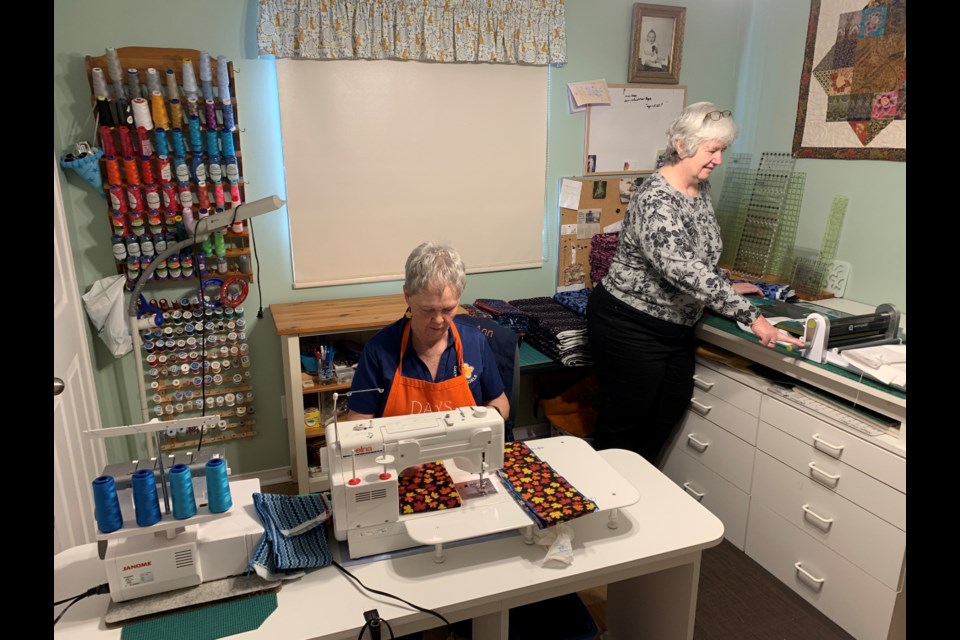Despite not being able to get together in nearly two years, a group of local volunteers has been busy cutting and sewing to create kits containing washable, reusable, beautiful menstrual health products for women in developing countries.
Ann Cavanaugh and Evelyn Stefanison run the Barrie-based volunteer team of Days for Girls Canada, an international, award-winning NGO (non-governmental organization) that works to shatter prejudice and limitations associated with menstruation for improved health, education and livelihoods.
Cavanaugh, who used to run a pray and sew group at St. Mary’s, saidher “heart leapt” after learning about Days For Girls five years ago, adding she knew it was an organization she wanted to support.
Now set to enter its sixth year, the local volunteer group started off small but has grown to approximately 40 members as well as the addition of a satellite group in Midland of approximately 25 people.
“They have absolutely no menstrual products at all (and use) stones, leaves, twigs, cardboard… If they miss one week of school, then the next month is harder and harder,” she said. “Our product gives them something they know they can depend on month after month because they’re made to last three to five years if looked after properly.
"Anything we can do to help with dignity and have the peace of mind that they don’t have to worry about gathering cardboard or stuffing out of a mattress because they have these kits… and they will see them through school and beyond," Cavanaugh added.
The kits are completely sustainable and include 11 pieces in total (including a protective shield and absorbent liner) and are made using flannel as well as 100 per cent cotton fabric for the shields and the drawstring storage bags, she said.
Each kit costs approximately $20 to make, which is why donations like the one her group recently received from Retired Teachers of Ontario/Les enseignantes et enseignants retraités de l’Ontario District 17-Simcoe County (RTO/ERO District 17-Simcoe County), is so essential.
“That’s why getting that $800 was just marvellous,” she said. “We have had fabric donated, but we prefer to purchase it ourselves because (with the flannel at Fabricland) nine-tenths of them we can’t use because they have animals and faces on them. We are very restricted on what we can use.”
Despite the pandemic putting the group at a standstill, volunteers have continued making kit components at home and, over the last two years, have sent 120 kits to Vision Canada for distribution to Haiti, 88 kits to the Canadian Economic Development Assistance for South Sudan (CEDASS) project in January 2022. Volunteers also contributed 290 kits to the Women's Relief Organization, which will be distributed in Solwezi, Zambia.
The group hasn’t had a workshop since May 2020, and volunteers are anxious to get back together, said Cavanaugh, adding they plan to hold their first workshop on March 9.
Evelyn Stefanison, who became involved four years ago, said it was a cause that just “grabbed” her.
“It was one of those things that someone asked if I knew how to sew and invited me to meet the group. When I saw what they were doing, I remember that day asking Ann a hundred questions.
"I thought, if I had these questions, other people did as well, so that’s when I decided to get involved,” Stefanison added. “I think every woman can relate to problems that young girls have to deal with. Then, when you start to deal with menstruation without having any product, that would be a nightmare. My feeling is that Days For Girls — (and) the days refers to their days in school, (so) if girls lose their education that’s not a good thing. If we can keep girls in school the world will be a better place.”
Stefanison added through her involvement with Days For Girls, she's also learning that it’s not just women in developing countries that need help.
“What I am finding out now is that there are women and girls in Canada who are experiencing what they’re calling period poverty. Women are making choices when they’re doing their groceries. … Do they buy their product or do they buy food?”
Since 2008, Days For Girls have reached more than 2.4 million women and girls in 144 countries with menstrual health solutions and education.


